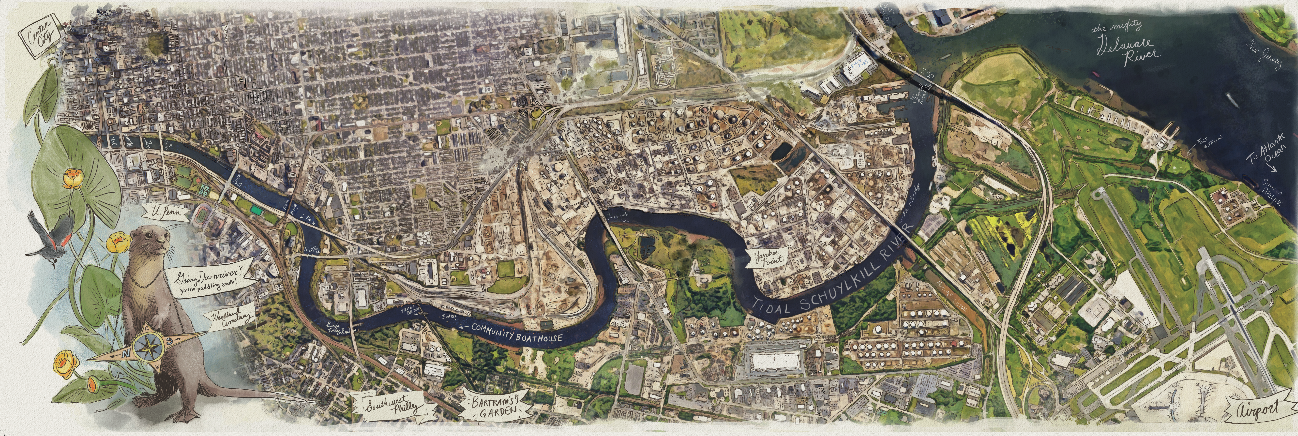Sink, Float, Spill, Flow
Engaging Art + Science on Philadelphia’s Rivers

A group of four Penn faculty and staff from anthropology (Nikhil Anand), history and sociology of science (David Barnes), medicine (Marilyn Howarth), and languages and literatures (Bethany Wiggin) intend to expand ongoing efforts to create a corps of faculty and students at Penn to develop and conduct interdisciplinary public research that explores Philadelphia’s waters – past, present, and future. Climate change transforms the natural and built environments, and it re-shapes how we make sense of and care for our past. Climate changes how we understand our histories, all the while disrupting/unsettling our future expectations. Its scope suggests the need for public engagement.
Each member of our Sink, Float, Spill, Flow (SFSF) group participates actively in the Penn Program in Environmental Humanities, including the Friday meetings of the Research Seminar of the Schuylkill River and Urban Waters Corps (SRUWC), an informal collective of academic, non-profit, civic and community organizations. Founded in April 2016, the SRUWC is based in Philadelphia and is co-convened by Bartram’s Garden, the Drexel Air Research and Resources Laboratory (DARRL), and the Penn Program in Environmental Humanities. We are devoted to exploring and stewarding urban waters past and present from a transnational, interdisciplinary perspective.
From June 18-29, 2018, the SRUWC offered its first On-Water Intensive Research Seminar. The intensive met on mobile, on-water classrooms (on floats, wooden boats, kayaks, and motorized launches) as well as in workspaces on land in University City, Bartram’s Garden, and the John Heinz National Wildlife Refuge. Students received intensive mentoring by the seminar instructors and collaborated closely with one another to develop their own final interdisciplinary projects. The Intensive Seminar is designed to catalyze an array of public humanities and citizen science projects on Philadelphia’s rivers. It is open to Drexel graduate students for course credit by application, to select community members at large as paid participants, and to Penn students as paid research associates.
In the two weeks prior to beginning the On-Water Intensive, Sink, Float, Spill, Flow faculty and students met to learn about our group’s public-facing projects, co-developed with community partners. Together, we are collecting a living digital archive of materials about our project locations (available at SchuylkillCorps.org/). Students’ research begins by delving into these archival materials; they will later contribute their research to this digital humanities platform. This living archive’s current and anticipated projects include: contributing, collecting, and curating oral histories; wildlife and plant surveys; measuring air and water quality; developing a variety of tours, both online and in-person, self-guided and for groups.
In week one of SFSF work, students also visited our partner sites – at Bartram’s Garden, the John Heinz National Wildlife Refuge at Tinicum, the Independence Seaport Museum, and the Academy of Natural Sciences – to learn more about their histories and the communities who visit them. In week two, students continued this work and also crafted and peer edited short essays about their site visits and archival explorations.
In week three, SFSF students began participation in the On-Water Intensive. The ten-day intensive was a jump-start for their summer-length public research carried out over the following six weeks, and closely mentored by SFSF faculty. Together, as we reflect on and extend the work of the Intensive, we've begun the creation of a public curriculum of educational materials and art-science experiments designed for continued river engagement, historical and environmental health literacy, as well as stewardship--in conversation with, and including active participation from, diverse audiences, including the high school students who participate in our partners’ public boating programs. These programs managed by our community partners are in a period of rapid expansion, and the partners have asked SURGG faculty to catalyze the creation of this public environmental health and stewardship curriculum. Throughout the summer, the Penn students’ public projects were enriched through collaborative work with a team of artists – a photographer, a social cartographer, and an animator and filmmaker.
Our work with students generates possibilities and opportunities for analytical, critical, and creative work along, on, or in the water itself. The outcomes of the student research launched by the Intensive align with SFSF faculty’s initiatives which may be grouped under two rubrics:
Oral Histories and Focus Group Interviews
-
the (ongoing) Eastwick Oral History Project
-
the (anticipated) Bartram’s Garden Anglers and Boaters Oral History Project, and Tinicum Island Oral History Project
-
Interviews (ongoing) with focus groups to measure environmental health literacy
Critical and Creative Maps
-
Tinicum Island Community Memory Map
-
Bartram’s Community Boathouse River Guide
-
Rising Waters Philadelphia digital and print maps of historical and future flows, including the creation and transfer of property and its uses, from the early colonial period to the present
Audio Tours
-
Environmental health literacy tour of Bartram’s Garden
To celebrate their work, the faculty and students of SFSF held a project design charette August 24, 2018. Among the summer's final outcomes will be a collaborative book-length Field Guide to Teaching on Water, on which SFSF faculty are currently at work.
Sink, Float, Spill, Flow is supported through the Penn's Summer Undergraduate Research Group Grants (SURGG) in the Center for Undergraduate Rsearch and Fellowships at the University of Pennsylvania.
Image Credit: Cecily Anderson, Tidal Schuylkill, Ecotopian Toolkit 2017
